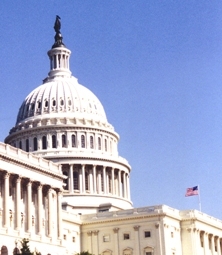ARLINGTON, VA – The National Milk Producers Federation (NMPF) today questioned the selective and simplistic interpretation of new dairy legislation by organizations opposed to the Dairy Security Act (DSA) that Congress is now debating.
On Oct. 24th, the Dairy Business Association (DBA), an organization of dairy producers and corporate interests based in Wisconsin, issued a press release that cited the findings of a review of the congressional dairy legislation by Dr. Mark Stephenson of the University of Wisconsin, and Dr. Chuck Nicholson of Cal Poly-San Luis Obispo.
The release, which was jointly issued by DBA and the Wisconsin Cheese Makers Association (WCMA), noted that with high participation by dairy producers in its safety net programs, the Dairy Security Act could cost the U.S. government “About $2 Billion More than Current Dairy Programs.”
However, on October 25th, a short paper authored by Drs. Stephenson and Nicholson reported that the provisions of the DSA, if enacted with high dairy producer participation, would save the U.S. government close to $700 million. Specifically, the DBA interpretation reported government expenditures of $3.663 billion, versus a baseline of $1.601 billion during 2012-2020, while the recent Stephenson/Nicholson paper shows government expenditures of just $824 million, versus a baseline of $1.592 billion during 2012-2018, under a high participation scenario.
According to NMPF, these contrary findings “clearly illustrate the challenges associated with simplistic attempts to communicate results from complex economic modeling,” said Jerry Kozak, President and CEO of NMPF.
The authors themselves note on page 2 of their paper that, “Each of these assumptions about how producers will respond to the program is highly uncertain.” Those uncertainties are illustrated by the fact that although their paper says that the market stabilization program will be in effect 40 to 45% of the time, the reality is that between 2006, and the present, it would have triggered in only 9% of the time, Kozak said.
“Some economic models are acutely sensitive to the assumptions used in the analysis – as is the case with the Stephenson/Nicholson model. Unfortunately, the more sensitive the model, the more likely that dramatic differences in outcomes will result from relatively minor changes in the assumptions underlying the analysis,” he said.
Because of the great variation in reported results, “it must be concluded that changes in the assumptions used in the analysis occurred between the issuance of the DBA release, and the subsequent appearance of the authors’ own papers. Consequently, it is extremely difficult to utilize any background information or results from this study in a substantive public policy discussion,” Kozak said.
Drs. Stephenson and Nicholson themselves noted the limitations of their model with respect to how the DSA would affect net farm operating income (NFOI) due to lower prices:
“It is important to note however, that the current volatility imposes costs on farms (that is, it usually requires changes in management and financing that have costs) and can result in substantial equity loss and a higher probability of business failure. These costs and risks are not directly included in our analysis, so it is not possible to conclude on the basis of reduced average NFOI that dairy farmers would be worse off under the proposed legislation.”
“Such caveats by economic researchers are often excluded by those attempting to focus on specific outcomes which serve their messaging purposes. This certainly appears to be the case regarding the press release issued by the Dairy Business Association and the Wisconsin Cheese Makers Association,” Kozak said.
“No one’s interests are well served when the debate surrounding efforts to reform federal dairy policy is subjected to selective or less than complete reporting of pertinent research,” said Kozak.
The National Milk Producers Federation, based in Arlington, VA, develops and carries out policies that advance the well being of dairy producers and the cooperatives they own. The members of NMPF’s 31 cooperatives produce the majority of the U.S. milk supply, making NMPF the voice of more than 32,000 dairy producers on Capitol Hill and with government agencies.



 U.S. Dairy Industry Welcomes Lifting of Mexican Retaliation Tariffs
U.S. Dairy Industry Welcomes Lifting of Mexican Retaliation Tariffs Indiana Republicans Adopt Dairy Security Act as Marker for Dairy Portion of Farm Bill
Indiana Republicans Adopt Dairy Security Act as Marker for Dairy Portion of Farm Bill



